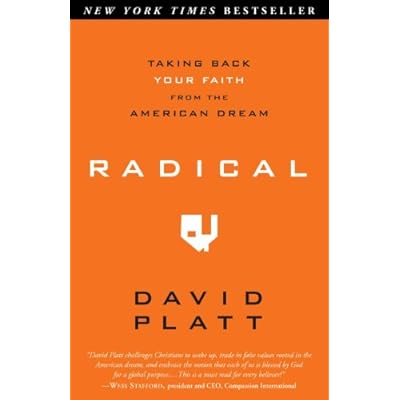Radical, chapter 7...finally catching up, & jumping right in.
Platt hit the nail on the head here:
On one hand, many professing Christians have embraced the universalistic idea that religion is merely a matter or preference or opinion and that in the end all religions are fundamentally the same. People do not have to trust in Christ in order to know God or go to heaven. Therefore, there is no need to encourage someone else to embrace the truth of Christianity. On the other hand, while some professing Christians have rejected universalism intellectually, practically they may end up leading universalistic lives. They claim Christ is necessary for salvation, yet they live their Christianity in silence, as if people around them in the world will indeed be okay in the end without Christ. (142)
In today's world, we place such an importance on not judging others, that we live dangerously close to the line of accepting their religions. Society tells us to be accepting, but God tells us not to accept any false religion. We love the people, & continue to be Jesus to them, but under no circumstances are we to accept their God, or make light of the fact that salvation is through Christ alone.
Years ago, I heard a friend say that he would rather someone believe in something rather than nothing. He'd rather someone be Buddhist, or Hindu, or Muslim than that person be an atheist. That theory has haunted me ever since then. If you're not going to believe in Jesus as the Way, Truth, & Life, it doesn't matter what you believe, because you will be judged & you will be found lacking the one thing that is necessary.
This chapter covers what Platt calls the "Seven Truths":
one. All people have knowledge of God.
two. All people reject God.
three. All people are guilty before God.
four. All people are condemned for rejecting God.
five. God has made a way of salvation for the lost.
six. People cannot come to God apart from faith in Christ.
seven. Christ commands the Church to make the Gospel known to all peoples.
I loved how Platt explained that much of humankind views heaven as the default eternal state. We think that unless we do something really bad, we automatically go to heaven.
When I read about this, I thought about our judicial system. Innocent until proven guilty? That's not how it works with God. None of us are innocent. We're all guilty from day one & until we are washed by the blood of Christ, we cannot be innocent.
The will of God is for you and me to give our lives urgently and recklessly to making the gospel and the glory of God known among all peoples, particularly those who have never even heard of Jesus. The question, therefore, is not “Can we find God’s will?” The question is “Will we obey God’s will?” (160)
All of this just reiterates one thing: Jesus is not a way, but the Way.









